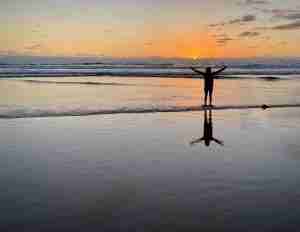Uh oh. It’s happening again. Someone suggested that you speak on your work project and that huge wave of dread is taking over. It sends the all-too-familiar tingles up the back of your neck and your mind goes completely blank. You feel stuck in place, frozen, unable to do anything but sweat and fake a smile. Your heart races. You couldn’t track your thoughts, even if you wanted to. If this reaction is familiar to you I have good news for you!
You are not alone
So many of us experience the fear of being seen, and all the discomfort it comes with. And if you’re part of this lucky group, it goes without saying that this fear has big impacts on much of our lives. It detracts from the ability to make friends, experience & enjoy new things, and even advance in our careers. But why is it so hard to be visible AND comfortable at the same time? And what can we do to change it?
Why Visibility Can Feel Scary
I’m not one for wasting time, so let’s cut right to the point:
At its core, fear of visibility is rooted in fear of judgment and rejection.
Ultimately, those of us carrying this fear are afraid that others will see us for who we really are—the good and the bad—and judge us harshly. We’re afraid that someone is going to see all of our flaws, unfilled intentions, failures, and use them to hurt us. Or worse, that they will see all of that and then reject us.
Where this stems from for you personally is something for you and your therapist to figure out. But generally speaking, this fear is related to when you did experience painful rejection. At some point, you were vulnerable about your likes, dislikes, values, etc., and the receiving end didn’t handle it with care. And in order to protect you from going through that type of pain again, your mind and body learned how to read the room. Really, really well.
You learned to scan those watching, track their emotions, monitor the conversation through verbal and non-verbal cues, among the so many other things that shape a person’s experience. You’ve become aware of it all. Including how you affect their experience. Enter in the paralyzing fear that if you cause discomfort on their end, rejection becomes inevitable.
visible = vulnerable
Your mind and body may continue to raise red flags around situations that look dangerously similar to that painful event. The flags shout things like ‘Did you forget?’ and ”Hey, this situation looks similar to some painful ones before!’. They then trigger a response that has kept you safe in the past. You know the one where you freeze up, want to run and hide, or want to do both at the same time? This response is helpful if you are actually in danger, but when you’re not.. it’s quite a struggle. It prevents us from taking risks or being vulnerable in ways that are actually good for us.
Being visible to others means that we (1) allow them to see us, and, subsequently, (2) open ourselves up to the possibility that they might not accept us or like what they see. This vulnerability can be incredibly hard to stomach. Especially so if we are already feeling insecure about ourselves, or have a hair-trigger alarm system like that one described above. It’s no wonder that lots of us avoid being visible altogether!
It Doesn’t End Here
Fear of visibility can be debilitating and downright frustrating to deal with. Now that we know about the functionality of this fear, and why it exists, we have wiggle room to make changes. In Part 2 of this article you’ll be able to put to use 4 steps to start tackling this fear all on your own.
If you’re done waiting and ready to start tearing down the fear of being visible, but are feeling overwhelmed with where to start, schedule your free pre-consultation today by clicking here. We’ll not only find the place to start, but create a roadmap to living a life that you truly love.






